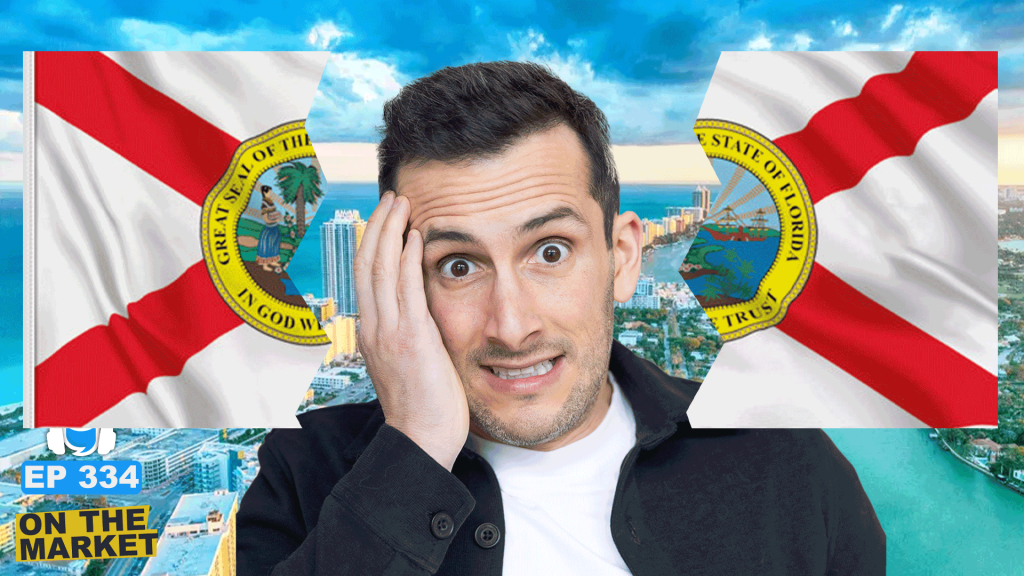Is Florida’s Housing Market Downturn a Sign of a National Correction — or Just a Local Blip?
By Boston Real Estate Investors Association — June 30, 2025
Florida’s real estate boom was legendary during the pandemic years — but now it’s quickly becoming a cautionary tale. Condo prices are dropping fast. Single-family homes are slipping in value. Insurance premiums are sky-high. Is Florida’s market crash a preview of what’s next for the rest of the country… or just a Florida problem?
In this episode of On the Market, host Dave Meyer breaks down the sharp shifts happening across the Sunshine State — and what smart investors should watch for in 2025.
Florida’s Pandemic Boom: How It Happened
Let’s rewind. Florida’s housing market didn’t just grow during the pandemic — it exploded. Between March 2020 and June 2022, Florida home prices jumped 51%. For context, the national average during that same time was 41% — Florida outpaced the rest of the country by a wide margin.
Why?
Mass Migration: Remote workers fled colder, pricier states for the warmth and tax advantages of Florida. In 2022 alone, Florida’s net domestic migration hit 314,000 — the highest of any state.
Job Growth: The influx of new residents attracted businesses, adding 240,000 jobs in 2023 alone — well above the national employment growth average.
No State Income Tax: Florida’s tax policies continued to lure both people and companies.
Aggressive Building: Developers raced to keep up, pushing thousands of new homes and condos to market.
The Reversal: Why Prices Are Dropping Now
Fast forward to 2025. The script has flipped. Florida is now the most visible example of a real estate correction in the U.S.
Migration Slowed: Net migration has dropped by 80% from its 2022 peak. Fewer new buyers mean softer demand.
Oversupply: Builders kept building, even as demand cooled. Now there’s too much inventory in some metros.
Insurance Shock: Florida’s average homeowner insurance premium now tops $11,000/year — the highest in the country by far.
Rising Property Taxes: Soaring home values mean bigger tax bills, squeezing homeowners’ budgets.
Condo Headaches: After the 2021 Surfside collapse, stricter rules have forced condo associations to issue costly special assessments — another big hit for owners.
All these factors mean Florida’s boom markets — especially condos — are now the biggest drag on national averages. More than 90% of Florida condo markets are down year-over-year. Two-thirds of single-family markets are down too.
Could This Spread? Comparing Florida to Texas and Wisconsin
To gauge whether this downturn might ripple across the country, Dave compares Florida to two very different states: Texas and Wisconsin.
✅ Texas:
Also boomed during the pandemic (home prices +40%).
Also has strong job growth and no state income tax.
Also built aggressively — but so far, Texas’ declines are milder and more isolated (Austin has dipped sharply; Dallas and Houston less so).
Key difference: Texas has high property taxes (~2%) but not the same insurance crisis as Florida. That’s likely keeping its correction less severe.
✅ Wisconsin:
Didn’t see a huge pandemic boom.
Modest, steady growth (+7–8% annually).
Little new construction = no oversupply.
Stable local demand = stable prices.
No major spikes in insurance or taxes.
Bottom line: Wisconsin’s market remains tight and still leans toward a seller’s market in 2025.
The Big Question: Is This a National Warning Sign?
If you invest in real estate outside Florida, should you worry?
Here’s Dave’s take:
Some hot Sunbelt markets (parts of Texas, Arizona, Louisiana) could see Florida-style corrections — but likely smaller.
The Midwest and Northeast, where migration, insurance costs, and supply are more stable, are likely insulated.
Nationally, prices may dip slightly in 2025 — but broad double-digit declines? Unlikely.
There’s little sign of rising mortgage delinquencies or forced selling, which typically drive bigger crashes.
Smart Investors Should Watch These Red Flags
Florida’s downturn is a reminder: Overheated markets correct. Look for:
Surging insurance costs
Too much new supply
Heavy reliance on new migration for demand
Unaffordable condo fees and special assessments
If you’re investing in the Gulf Coast, coastal Southeast, or Sunbelt metros, run the numbers conservatively — especially on condos or short-term rentals.
Final Thoughts: Keep a Local Lens
A market correction in Florida doesn’t mean your city is next. But it does mean any local market with runaway prices, big supply pipelines, and rising ownership costs could face similar headwinds. Stay informed, watch your local supply and demand numbers, and plan your next deal with eyes wide open.
Want more insights like this?
Join the Boston Real Estate Investors Association and stay connected with local and national trends that matter for your portfolio.
👉 Subscribe to our newsletter and never miss an update!

